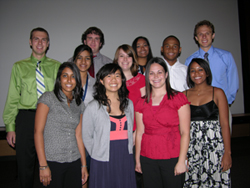 |
These students created the winning health disparities project addressing childhood asthma in an urban community. Front row from left are Ridhi Mehta of Illinois Wesleyan University, Rachel Wong of Scripps College, Kelly Samson of the University of Nebraska-Lincoln and Kara Calhoun of Rice University. Second row from left are Nikhila Balmoori of Creighton University, Karen Barbee of Boise State University and Raheem Sanders of Virginia State University. Third row from left are Codie Bourn of Northeast Community College, Edward Krajicek of Hastings College, Kia Ousley of Texas A&M University and Ben Nelson, a teacher’s assistant and second-year medical student at UNMC. |
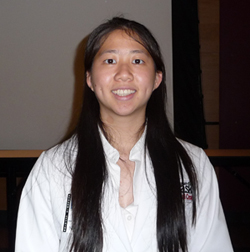 |
Anna Diec of the University of Kansas took home the “Hard Worker Award” and a gift package from Omaha Steaks. |
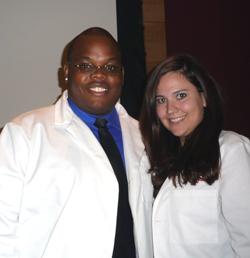 |
Joe Saffold, a student at Northwest Missouri State University, won the positive attitude and Mr. SMDEP awards. He is pictured with Ms. SMDEP, Krystle Graveline, a student at the University of Notre Dame. |
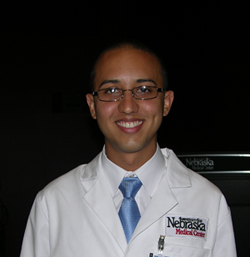 |
Edwin Vallejo, a student at Universidad Metropolitana, won the altruism award. |
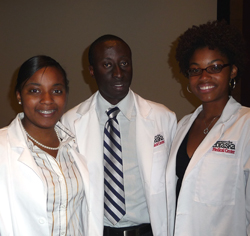 |
Camille Grimsley of Johnson C. Smith University, Alyndria Thompson of Hampton University, and Albert Bararwandika of the College of Mount Saint Vincent tied for the Spirit of Courage Award. |
The program brought 80 students from across the United States to help them prepare for a possible career as a physician or dentist.
SMDEP offers undergraduate freshman and sophomore students the opportunity to participate in rigorous science classes, prepare for professional school admission, network with other students and produce scientific projects.
The specialized six-week program also gives students the chance to shadow health professionals in the emergency room, observe transplant surgeries and conduct community-based research. This year, students produced a special health disparities project focusing on underserved communities.
The SMDEP program is designed to assist underrepresented students from economically or educationally disadvantaged backgrounds, rural students and students sincerely interested in serving in underserved communities with the necessary skills to be successful in the medical and dental admission process.
UNMC is one of only 12 campuses in the nation that hosted the program. Other institutions involved include Yale University, Columbia University, Duke University and Case Western Reserve University.
Already, the program is being called a success.
“We know this program works,” said Rubens Pamies, M.D., vice chancellor for academic affairs. “Eleven SMDEP scholars have been accepted into the UNMC College of Dentistry, and four more are already in the College of Medicine. This program is critical in allowing UNMC to recruit a diverse student body.”
Many Nebraska students already know the high-caliber education offered at UNMC, Dr. Pamies said. However, the summer program gives UNMC an opportunity to recruit beyond the traditional base.
“SMDEP helps promote the quality of our UNMC faculty, programs and facilities to students on a national scale,” Dr. Pamies said. “Over the course of the program, we have an opportunity to connect with some of the best and brightest upcoming health professional students. Our hope is that these students will apply to UNMC and recommend it to their classmates.”
“Through this program, we have formed a unique bond with each other, UNMC and Nebraska,” said Josh Davis, a student at North Carolina State University at Raleigh. “We have survived tornados, challenging classes and learned the importance of our work to eliminate health disparities. In fact, we already feel like students here. Most of us will apply here and be honored to be a part of this program.”
This year’s program included a specific focus on a community-based health disparity. Students divided into groups and competed to create the best solution to a local health problem. The winning project focused on childhood asthma, a condition that disproportionately affects minorities in Omaha’s urban areas.
“Our group created a coloring booklet for children to play with in doctors’ offices. It contained word searches for kids to fill out that teaches them important health information about pollution and smoking,” said Ben Nelson, a UNMC second-year medical student who also served as a SMDEP teaching assistant.
“A greater emphasis on health disparities is something many students asked for,” SMDEP coordinator Giovanni Jones said. “The information and hands-on solutions they gained in this program will not only help Nebraskans but also the communities where these students attend college.”
As more SMDEP scholars prepare to step foot on UNMC’s campus this fall, it demonstrates not only the caliber of this program but also the importance it is making in the lives of the next generation of health professionals, Dr. Pamies said.